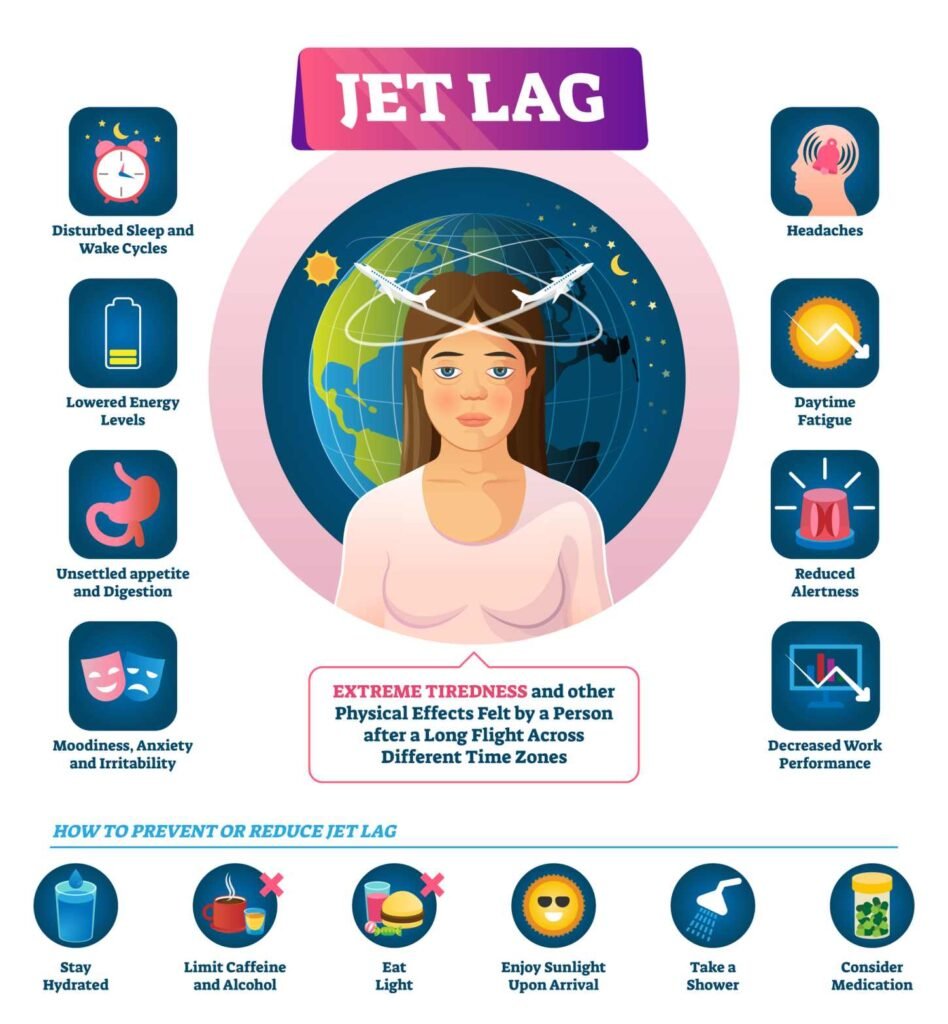Jet lag disorder is a common condition that affects individuals who travel across multiple time zones.
Jet lag disorder is a type of circadian rhythm disorder that occurs when the body’s internal clock is disrupted, leading to a range of symptoms such as fatigue, insomnia, and difficulty concentrating. Jet lag disorder can be particularly challenging for individuals who travel frequently, as it can significantly impact their quality of life and productivity.
The severity of jet lag disorder can vary depending on several factors, including the number of time zones crossed, the direction of travel, and individual differences in circadian rhythm. While some people may experience only mild symptoms that resolve within a few days, others may struggle with more severe symptoms that can last for several weeks.
Treatment options for jet lag disorder include lifestyle modifications, such as adjusting sleep and meal schedules, as well as medication to help regulate the body’s internal clock.

Understanding Jet Lag Disorder
Circadian Rhythms and Travel
Jet lag disorder is a common condition that affects individuals who travel across multiple time zones. The human body has an internal clock, also known as the circadian rhythm, which regulates various physiological processes such as sleep-wake cycles, hormone secretion, and body temperature. When an individual travels to a different time zone, their circadian rhythm is disrupted, causing them to feel out of sync with the new daylight hours. This condition is also known as desynchronosis or circadian dysrhythmia.
Symptoms and Severity
The severity of jet lag disorder depends on various factors such as the number of time zones crossed, the direction of travel, and individual factors such as age, health, and sleep habits. The symptoms of jet lag disorder can include fatigue, insomnia, irritability, headache, digestive problems, and difficulty concentrating. These symptoms can last for a few days or even a week, depending on the severity of the disruption to the circadian rhythm.
To minimize the symptoms of jet lag disorder, individuals can take various measures such as adjusting their sleep schedule before travel, staying hydrated, avoiding alcohol and caffeine, and exposing themselves to natural light during the day. In severe cases, medication such as melatonin or sleeping pills may be prescribed to help regulate sleep-wake cycles.
In conclusion, understanding the circadian rhythms and their disruption during travel is crucial in managing jet lag disorder. By taking appropriate measures before and during travel, individuals can minimize the severity of symptoms and adjust more quickly to the new time zone.
Factors Influencing Jet Lag
Travel Direction and Time Zones
The severity of jet lag is largely determined by the number of time zones crossed during travel. The more time zones crossed, the more severe the jet lag symptoms are likely to be. This is because the body’s circadian rhythm, which regulates sleep-wake cycles, is disrupted when traveling across time zones. Jet lag is typically worse when traveling eastward, as the body has a harder time adjusting to a shorter day.
Individual Susceptibility
Not all travelers are equally susceptible to jet lag. Factors that can influence an individual’s susceptibility to jet lag include age, traveler type, and the ability to adapt to local time. Older adults may experience more severe symptoms of jet lag than younger adults, and business travelers and athletes may be more susceptible due to the frequency of their travel. Pilots and flight attendants, who frequently cross time zones, may develop a greater tolerance to jet lag over time.
Other risk factors for jet lag include pre-existing sleep disorders, anxiety, and stress. These factors can exacerbate the symptoms of jet lag and make it more difficult to adapt to local time.
To minimize the effects of jet lag, travelers can take steps such as adjusting their sleep schedule before travel, staying hydrated, and exposing themselves to natural light at the destination. Some travelers may also find it helpful to take melatonin supplements to regulate their sleep-wake cycles.
Managing and Treating Jet Lag
Behavioral Adjustments
One of the most effective ways to manage and treat jet lag is through behavioral adjustments. This includes adjusting sleep schedules prior to travel, staying hydrated, avoiding alcohol and caffeine, and getting regular exercise. It is also important to maintain a healthy diet and avoid overeating, especially during mealtimes that may be outside of one’s normal schedule.
Pharmacological Aids
In some cases, pharmacological aids may be used to manage jet lag. Melatonin supplements can help regulate sleep-wake cycles, while sleeping pills such as zolpidem or temazepam can be used to treat insomnia or difficulty falling asleep. However, it is important to speak with a healthcare provider before using any medication, as they may have side effects or interact with other medications.
Light Therapy and Lifestyle Changes
Light therapy and lifestyle changes can also be effective in managing jet lag. Bright light exposure can help regulate the body’s natural rhythms, while avoiding light during certain times can help promote sleepiness. Earplugs and eye masks can also be useful in creating a sleep-conducive environment. It is important to plan ahead and make adjustments to one’s schedule as needed to avoid stress and disorientation.
Overall, managing and treating jet lag requires a combination of behavioral adjustments, pharmacological aids, and lifestyle changes. By staying hydrated, maintaining a healthy diet, and getting regular exercise, individuals can help regulate their sleep-wake cycle and reduce the severity of jet lag symptoms. It is important to speak with a healthcare provider before using any medication or making significant changes to one’s routine.
Practical Tips for Travelers
Before the Flight
Travelers can take several measures to minimize the effects of jet lag before their flight. It is recommended that they adjust their sleep schedule to match the local time of their destination a few days before the flight. This can help the body to gradually adapt to the new time zone. Additionally, travelers should avoid consuming caffeine or alcohol, which can disrupt their sleep schedule and lead to dehydration.
During the Flight
During the flight, travelers should stay hydrated by drinking plenty of water and avoiding caffeinated beverages like coffee. They should also try to get some rest by sleeping during the flight, especially if it is a long-haul flight. Exposure to daylight and sunlight can also help to regulate the body’s circadian rhythm and reduce the effects of jet lag.
Upon Arrival
Upon arrival, travelers should try to adjust to the local time as quickly as possible. This can be achieved by getting exposure to daylight and sunlight during the day and avoiding bright lights and darkness at night. It is also important to maintain a regular sleep schedule and avoid napping during the day, which can disrupt the body’s circadian rhythm.
Overall, travelers should be aware of the effects of air travel on their body and take steps to minimize the impact of jet lag. By staying hydrated, getting enough rest, and adjusting to the local time, travelers can reduce the symptoms of jet lag and enjoy their trip without any unnecessary discomfort.
10-3-2-1-0 Sleep Rule: A Simple Guide to Better Sleep

The 10-3-2-1-0 sleep rule is designed to help individuals maintaining a regular sleep schedule that promotes restful and restorative sleep. By following this rule, individuals can create a relaxing environment that signals to the body that it is time to sleep.
Continue reading about the: 10-3-2-1-0 Sleep Rule
MaryRuth Organics Sleep Gummies Without Melatonin Review: Do They Work?

These gummies are designed to promote relaxation and support sleep quality for adults. Unlike many other sleep aids, they don’t contain melatonin, so you won’t wake up feeling groggy or drowsy.
Continue reading: MaryRuth Organics Sleep Gummies Without Melatonin




